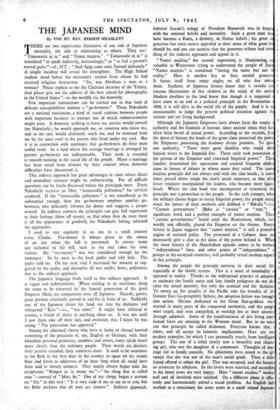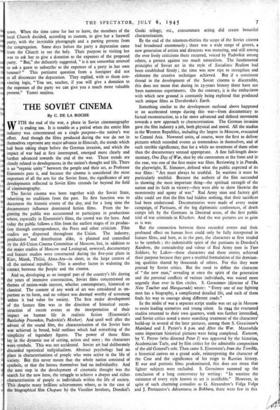THE JAPANESE MIND
By THE RT. REV. BISHOP HEASLETT
THERE are two expressions illustrative of one side of Japanese mentality, the side of relationship to others. They are: " Tomawashi ni iu " and " Yumei mujitsu." " Tornawashi ni iu" is translated " to speak indirectly, insinuatingly," or " to feel a person's mental pulse "--cf., 0.T.: " And Agag came unto Samuel delicately." A simple incident will reveal the atmosphere. The High School student stood before the missionary teacher from whom he had received religious instruction. " Sir, was Abraham a man or a woman? Please explain to me the Christian doctrine of the Trinity. And please give me the address of the best school for photography in the United States "—to the worldly via the heavenly.
Few important transactions can be carried out in that land of delicate susceptibilities without a " go-between." These Nakadachi are a national institution, a kind of social cushion between people with important btniness to transact out of which embarrassments might arise. A domestic wishing to leave my service would consult her Nakadachi ; he would approach me, or someone who knew me, and so the case would ultiMately reach mc, and be returned from me by the same road to the person who lived under my roof. But it is in connection with marriages that go-betweens do their most useful work. In a land where the average marriage is arranged by parents go-between are indispensable. Their work is essential to smooth running in the social life of the people. Many a marriage has been saved from disaster by their counsel when domestic difficulties have threatened it.
This indirect approach has great advantages in cases where direct and immediate contacts might be embarrassing. For all difficult questions can be freely discussed before the principals meet. Every Nakadachi receives an Orei, "honourable politeness," for services rendered. If the " honourable politeness " is not considered to be substantial enough, then the go-between employs another go- between, who delicately informs the donor and suggests a proper reward. In indirect contacts the principals can give full expression to their feelings (blow off steam), so that when they do meet there is all the appearance of goodwill, the Nakadachi having softened the approaches.
I used to stay regularly in an inn in a small country town, Chadai. Tea-money is always given to the owner of an inn when the bill is presented. It covers items not included in the bill, such as tea and cakes for your visitors. My " tea-money " was not considered enough by the innkeeper. So he went to the local padre and told him. The padre told me On my next visit I increased the amount as sug- gested by the padre, and thereafter all was smiles, bows, politeness, due to the indirect approach.
The Japanese language lends itself to this indirect approach. It is vague and indeterminate. When waiting in an enclosure along the route to be traversed by the funeral procession of the great Emperor Meiji, my companions were all Japanese. Guards, guests, great persons constantly passed to and fro in front of us. Suddenly one of the Japanese thrust his head out into the darkness and whispered " Kita "—i.e., " has come." It might have referred to anyone, a friend of theirs or anything about us. It was not until I saw them take off their hats and overcoats that I knew he was saying " The procession has appeared."
Among the educated classes who have at home or abroad learned something of the precision of, say, English or German, with their abundant personal pronouns, numbers and tenses, many speak much more clearly than the ordinary people. Their words are distinct, their periods rounded, their sentences short. It used to be weariness to the flesh in my first days in the country to squat on the tatami floor and listen to addresses of an hour long when all could have been said in twenty minutas. They nearly always began with the periphrasis "Ningen to iu mono wa "—" the thing that is called man "—instead of "Man, &c." One of my clergy began a sermon on " Sin" in this way: " It is very rude of me to say so to you, but the Bible declares that all men are sinners." Indirect approach. Admiral Suzuki's eulogy of President Roosevelt was in keep with the national beliefs and mentality. Such a great man mu have become a Kami, a divinity, in Shinto beliefs ; his great a generous but stern nature appealed to their sense of what great m should be, and one can surmise that the generous tribute had som thing of the indirect approach and appeal in it.
" Yumei mujitsu," the second expression, is illuminating, an valuable to Westerners trying to understand the people of Japa " Yumei mujitsu " is translated " having the name but not t reality." Here is another key to their mental processe It forces itself from many angles on all who live amo
them. Students of Japanese history know that it reveals co sinuous illustrations of this element in the mind of the natio Modern dwellers in the land know that though it is supposed t have come to an end as a political principle in the Restoration 1868, it is still alive in the social life of the people. And it is n unreasonable to judge the present political situation against th. ancient and yet living background.
Although the Japanese Emperors have always been the source authority and the fountain of honour, since ancient times they hay often been bereft of actual power. According to the records, fro the dawn of history the heads of the great clans possessed the powe the Emperors possessing the shadowy divine position. To quo one authority, " There were great •families who could alon furnish wives to the Imperial line. These early took possession o the person of the Emperor and exercised Imperial power." The families determined the succession and secured frequent abdica tions in favour of infants in whose name they ruled. The yurne mujitsu principle did not always end with the clan heads ; it some times passed down inside the clan's social structure, so that ofter lesser retainers manipulated the leaders, who became mere figure• heads. Where the clan head was incompetent or tyrannical this principle was a .protection to the people. In the 12th century, whe the military classes began to usurp Imperial power, the people recog nised the nature of their methods and dubbed it " Bakufu "—i.e " Curtain government." (Baku is " curtain" or " teM.") significant word, and a perfect example of yumei mujitsu. Thes " curtain governments " lasted until the Restoration, which, out, wardly and officially, placed the Emperor on the throne. Recen history in Japan suggests that " yumei mujitsu " is still a powerfu, engine of national polity. The personnel of a Cabinet does no necessarily give a clue to the ideas of the power behind it. Whet the inner history of the Manchukuo episode comes to be written " independence " here, and other grants of " independence" to groups in the occupied countries, will probably reveal modern aspect of this principle.
Among the people the principle survives in their social lif especially in the family system. This is a maze of nominality a opposed to reality. Thanks to the widespread practice of adoptio to maintain the family name and line, family pedigrees do not dis close the actual ancestry, but only the nominal and the fictitious To sweep up the peoples of the Pacific into the benefits of the Greater East Co-prosperity Sphere, the adoption fiction was brought into action. Shrines dedicated to the Great Sun-goddess wero erected in many parts of the conquered territories, and the people were urged, and even compelled, to worship her as their ancestot through adoption. Some of the manifestations of this living Intel• lectual force are amazing to the Western mind. But in no sensd can this principle be called dishonest. Everyone knows that it exists, and all accept its fantastic implications. Here are two modern examples, for which I can personally vouch, from intelligen groups. The son of a titled family met a beautiful and charm ing girl, who was the daughter of a commoner. Thoughts of mar riage led to family councils. No objections were raised to the gir except that she was not of the man's social grade. Then a titled friend offered to adopt the girl. This was accepted, and she became an aristocrat by adoption. So the lovers were married, and according to the latest news are very happy. Here " yumei mujitsu" worked well and all involved were satisfied. On a different plane it effec- tively and harmoniously solved a social problem. An English lade worked as a missionary for some years in a small inland Japanese town. When the time came for her to leave, the members of the local Church decided, according to custom, to give her a farewell party, with the inevitable photograph and a parting present from the congregation. Some days before the party a deputation came from the Church to see the lady. Their purpose in visiting her was to ask her to give a donation to the expenses of the proposed party. " But," she delicately suggested, " is it not somewhat unusual to ask a guest to subscribe to the expenses of a party in her own honour? " This pertinent question from a foreigner did not at all disconcert the deputation. They replied, with to them con- vincing logic, " You see, teacher, if you will give a donation to the expenses of the party we can give you a much more valuable present." Yumei mujitsu.





























 Previous page
Previous page